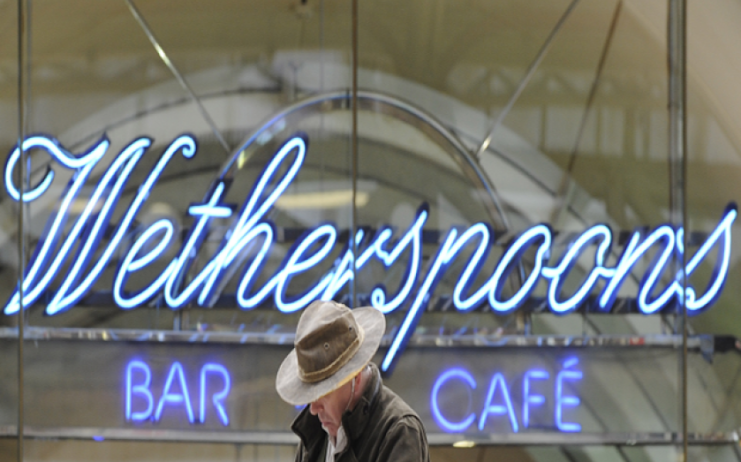Sales slow at J D Wetherspoon as costs rocket and punters dip

Sales at J D Wetherspoon dipped four per cent in the third quarter as the pub group struggles to keep pace with pre-pandemic levels.
However, analysts said the pub chain could be set to reap the benefits of consumers opting for cheaper nights out amid soaring living costs.
Year-to-date like-for-like sales have also decreased by 6.2 per cent as inflationary concerns start to shake pub goers.
In the financial year to date, the company has disposed of six pubs. A further five pubs have been surrendered to landlords, following lease expiries. In addition, three leasehold pubs have been closed, in anticipation of lease expiries.
Net debt at the end of the quarter was £906m and liquidity was £173m. Debt is expected to be around £870m at the end of the financial year.
Discussing the results, the chairman of the budget pubs, Tim Martin, said: “Since Covid restrictions ended, sales have improved, as previously reported. As many hospitality companies have indicated, there is considerable pressure on costs, especially in respect of labour, food and energy. Repairs are also running at a higher rate than before the pandemic.
“The company anticipates a continuing slow improvement in sales, in the absence of further restrictions, and anticipates a “break-even” outcome for profits in the current financial year.”
However, all is not lost for the group, and it appears punters are focusing on experience led ventures.
Indeed, the company operates 47 pubs which have music, trading as ‘Lloyds’. Like-for-like sales for these pubs, in the quarter, were up 3.4 per cent. The company also operates 57 hotels. Like-for-like room sales during the quarter were also up, rising five per cent in this quarter.
He added that the biggest threat to pubs is the threats of future lockdowns and questioned the UK’s lockdown strategy compared to the likes of Sweden, which managed to avoid highly intrusive measures.
“The collateral damage from lockdowns has yet to be quantified, but the economic cost, approximately half a trillion pounds, financed largely by “money printing” by the Bank of England, is a direct cause of the current inflationary crisis”, he said.
AJ Bell investment director Russ Mould said the return of punters post-Covid was “absolutely critical to the company’s prospects” as the pub chain’s business model “has always been to prioritise volumes over margin performance.”
He added: “However, there is a difference between not obsessing over margins and dealing with the impact of rising costs of labour, energy and food. Against this backdrop breaking even for the current year, as Wetherspoons aims to do, is a laudable ambition.”
In fact, the pub operator could emerge as “one of the survivors” of the post-Covid era while many competitors are forced out of the market.
“While cost of living pressures are acute, people are likely to still want the escape of a trip to the pub and, assuming Wetherspoons can keep its prices keen despite inflationary pressures, it could benefit from people trading down,” Mould added.
“However, it definitely has a tricky period to navigate and its balance sheet is quite stretched. Shareholders will hope Wetherspoons’ ‘cautious optimism’ about a full return to normality in the financial year running to July 2023 proves not to be misplaced.”
Shares were down by some two per cent on Wednesday afternoon.